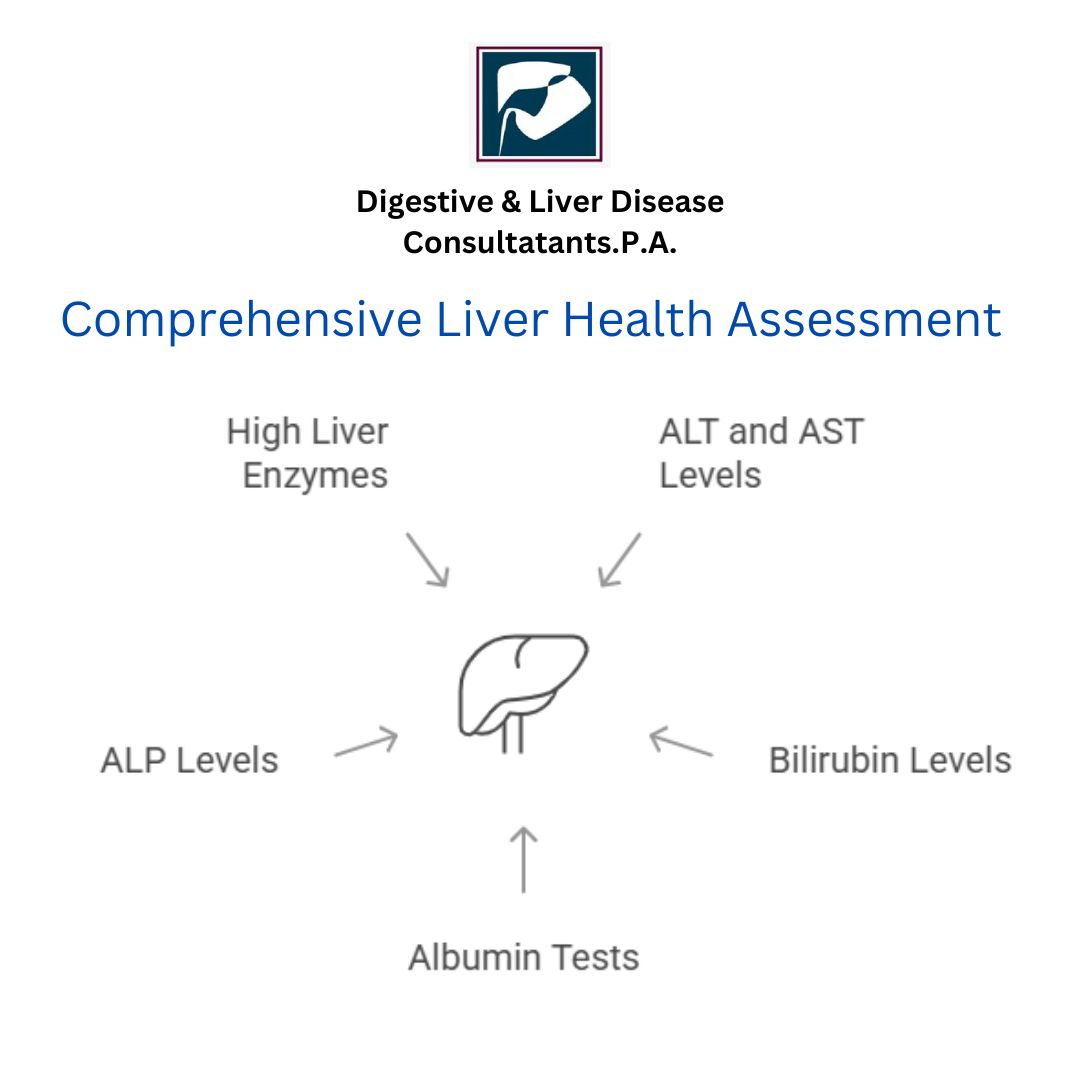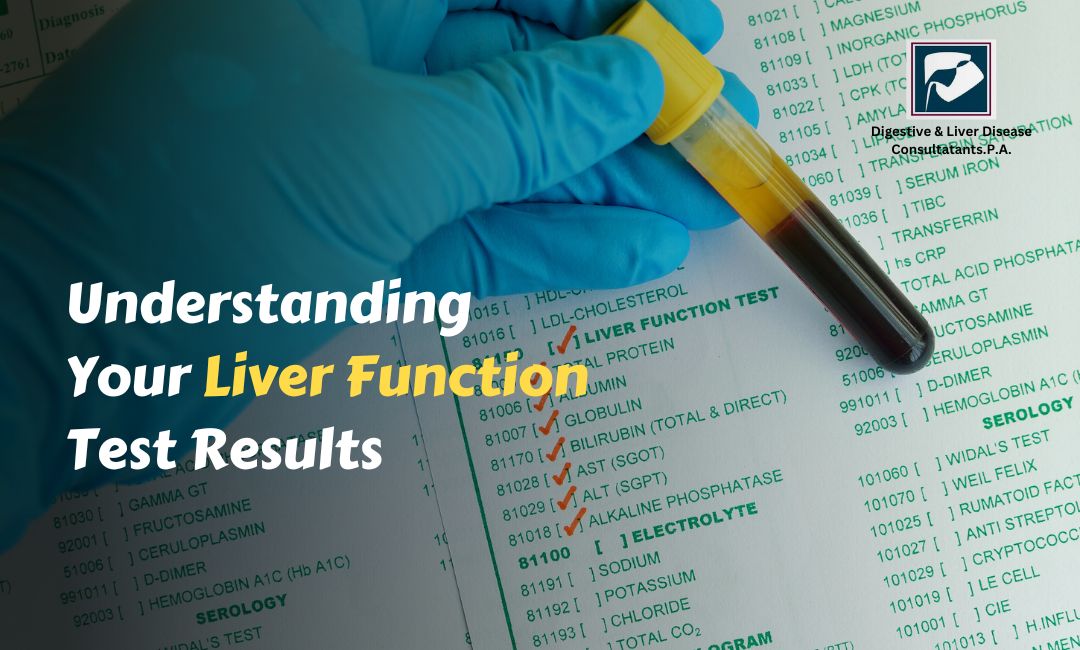When your doctor orders a liver function test (LFT), you may wonder what all those numbers mean. Don’t worry—you’re not alone! Many people feel confused when they first see their results. At Digestive & Liver Disease Consultants, P.A., we believe in making health information easy to understand. In this blog, we’ll explain what liver function tests check for, what different results mean, and what you should do next.
What Is a Liver Function Test?
A liver function test is a group of blood tests that check how well your liver is working. Your liver does a lot of important jobs like:
- Removing toxins from your blood
- Producing proteins for blood clotting
- Helping with digestion by making bile
- Storing vitamins and minerals
If your liver is not working properly, it can affect your entire body. That’s why checking your liver health is so important.

Why Would Your Doctor Order a Liver Function Test?
Doctors order liver function tests for many reasons, such as:
You have symptoms like yellowing skin (jaundice), dark urine, or unusual fatigue
- You have a history of liver disease
- You take medications that can affect the liver
- You drink alcohol regularly
- You have conditions like hepatitis, diabetes, or high cholesterol
Regular testing helps catch problems early, before they become serious.
What Does a Liver Function Test Measure?
Here are the key things that liver function tests usually check:
1. Alanine Transaminase (ALT)
- What it is: An enzyme found mostly in your liver.
- What high levels mean: Liver damage or inflammation.
2. Aspartate Transaminase (AST)
- What it is: Another enzyme found in your liver, heart, and muscles.
- What high levels mean: Possible liver damage, but it can also rise with heart or muscle injury.
3. Alkaline Phosphatase (ALP)
- What it is: An enzyme linked to bile ducts and bones.
- What high levels mean: Bile duct problems, liver disease, or bone disorders.
4. Albumin
- What it is: A protein made by your liver.
- What low levels mean: Liver damage or other conditions like kidney disease.
5. Bilirubin
- What it is: A waste product created when old red blood cells break down.
- What high levels mean: Problems with liver function or bile ducts; can cause jaundice.
6. Gamma-Glutamyl Transferase (GGT)
- What it is: An enzyme related to the bile ducts.
- What high levels mean: Liver disease, bile duct issues, or alcohol abuse.
7. Prothrombin Time (PT)
- What it is: A test that measures how long it takes your blood to clot.
- What prolonged PT means: Your liver might not be making enough clotting proteins.
How to Read Your Results
Liver function test results usually come with a reference range. If your numbers are outside this range, it doesn't always mean you have liver disease. Sometimes, small changes can be caused by:
- Temporary infections
- Certain medications
- Lifestyle factors like alcohol use or diet
However, significant changes usually mean your liver needs attention. It’s important to discuss your results with a liver specialist, like the team at Digestive & Liver Disease Consultants, P.A. We have years of experience in diagnosing and managing liver conditions with compassion and expertise.
What Can Affect Your Liver Test Results?
Many things can impact your liver test results, including:
Medications: Over-the-counter painkillers like acetaminophen can affect the liver.
Alcohol: Drinking too much alcohol is a common cause of liver injury.
Viral infections: Hepatitis A, B, and C can harm the liver.
Fatty liver disease is linked to obesity and diabetes.
Autoimmune liver diseases occur when your immune system attacks your liver cells.
When Should You Worry About Your Liver Function Test?
If your liver function tests are slightly off, your doctor might suggest:
- Monitoring your results with repeat testing
- Making lifestyle changes like reducing alcohol or losing weight
- Adjusting your medications
If your test results are very high, or if you have symptoms like jaundice, swelling, or confusion, your doctor may recommend further testing, imaging studies, or even a liver biopsy to find the cause.
How to Keep Your Liver Healthy
Taking care of your liver can prevent many health problems. Here are simple tips:
- Limit alcohol intake
- Eat a balanced diet rich in fruits, vegetables, and lean proteins
- Exercise regularly
- Avoid sharing needles
- Get vaccinated against hepatitis A and B
- Manage chronic conditions like diabetes and high cholesterol
- Avoid unnecessary medications and supplements
Your liver is incredibly strong and can even repair itself in many cases, but it needs your help to stay healthy!
About Digestive & Liver Disease Consultants, P.A.
At Digestive & Liver Disease Consultants, P.A., we are passionate about your digestive and liver health. Our team of board-certified gastroenterologists and liver specialists offers advanced testing, compassionate care, and personalised treatment plans. Located in Texas, we proudly serve patients with a wide range of digestive and liver conditions, from simple heartburn to complex liver diseases.
We believe that knowledge is power. Our goal is to give you the tools and support you need to manage your health with confidence. Whether you need routine screenings, second opinions, or long-term care for liver disease, we’re here to help.
Conclusion
Understanding your liver function test results doesn’t have to be overwhelming. Each number provides important clues about your liver’s health and how well it’s doing its vital jobs. By learning what these tests mean—and by working closely with your healthcare team—you can take better care of your liver and your overall health.
If you suffer from digestive problems like bloating, constipation, diarrhea, or other gut issues, don’t wait. Contact Digestive & Liver Disease Consultants, P.A., today to schedule a consultation. Let our team help you achieve better digestive health and a happier, healthier you!






